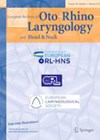
Journal Reviews
ChatGPT to select patients for biologic therapies in CRSwNP?
This short communication describes programming the artificial intelligence (AI) algorithm for systematic review of current literature about guidelines on the clinical efficacy and safety of biologics in the treatment of chronic rhinosinusitis with nasal polyps (CRSwNP). The authors first performed...
Use it or lose it…
The ageing auditory system: about 15 years ago, you could probably count on one hand the number of research papers on this subject. Now it seems one of the hot topics of discussion and investigation. This is, it seems, quite...
Higher risk and a tailored need
Historically, in audiology there is almost an unspoken understanding that when presented with a musician, a nuanced approach is likely to be required. Previous research has already shown there is a higher risk of noise exposure and accompanying signal distortion...
Inequitable access to cochlear implantation across the UK
Referral rates and uptake of cochlear implantation in the global adult population are low. Five audiology centres across England and Wales retrospectively explored data over a six-month period in late 2019, post implementation of new National Institute for Health and...
Surgical variations in maxillomandibular surgery treating sleep apnoea
This is a scoping review further highlighting the success in curing sleep apnoea with a maxillomandibular complex advancement. The variations outlined are on East and Southeast Asian patients to reduce the aesthetic concern of bi-maxillary protrusion when large advancements are...
Diurnal and monthly variations in secondary post-tonsillectomy haemorrhage rates
Several studies have looked into variable haemorrhagic rates with different methods of surgery and clinical backgrounds. Few have looked into non-clinical factors such as environment and diurnal influence on occurrence of post-tonsillectomy bleeding. This extensive study comprises 5357 tonsillectomy patients...
Vestibular schwannoma surgery and inner ear injuries
Iatrogenic inner ear injury during vestibular schwannoma (VS) surgery ranges between 20% and 30% in the literature. However, there is no up-to-date quantification of such injuries, hence this study. The authors conducted a US-multicentre database search looking for patients who...
How satisfying can a rhinoplasty be?
Rhinoplasty has seen an exponential rise in its uptake over the last few decades globally, offering patients a way to surgically correct the external appearance of the nose with the aim to improve cosmesis. Whilst the success of the procedure...
Recovery of vestibular function after vestibular neuritis
It is well known that recovery from vestibular neuritis (VN) is not solely mediated through central vestibular compensation, but also at the peripheral level. The authors conducted a prospective study to track the dynamic changes in recovery from vestibular neuritis...
Can prediction models help identify dysphagia in ventilated patients?
Dysphagia commonly affects patients in intensive care units (ICU), particularly those on mechanical ventilation, and is associated with high risk of mortality. This systematic review and meta-analysis aimed to identify predictors for dysphagia in ventilated ICU patients by summarising existing...
Thyroidectomy - a pictorial walk through the surgical steps
We as ENT surgeons work closely with the endocrinologist to provide MDT care for patients with a variety of pathologic conditions of the thyroid gland, including benign, malignant and hormonal disease processes. Surgery plays a central role for a variety...
Transverse venous sinus stenosis – a risk factor for CSF leak in patients with idiopathic intracranial hypertension
This was a multicentre (six French tertiary hospitals) retrospective case-controlled study aiming to investigate the rate of transverse venous sinus stenosis (TVSS) in patients with idiopathic intracranial hypertension (IIH) with nasal cerebrospinal fluid (CSF) leaks. They compared the preoperative MRI...

















